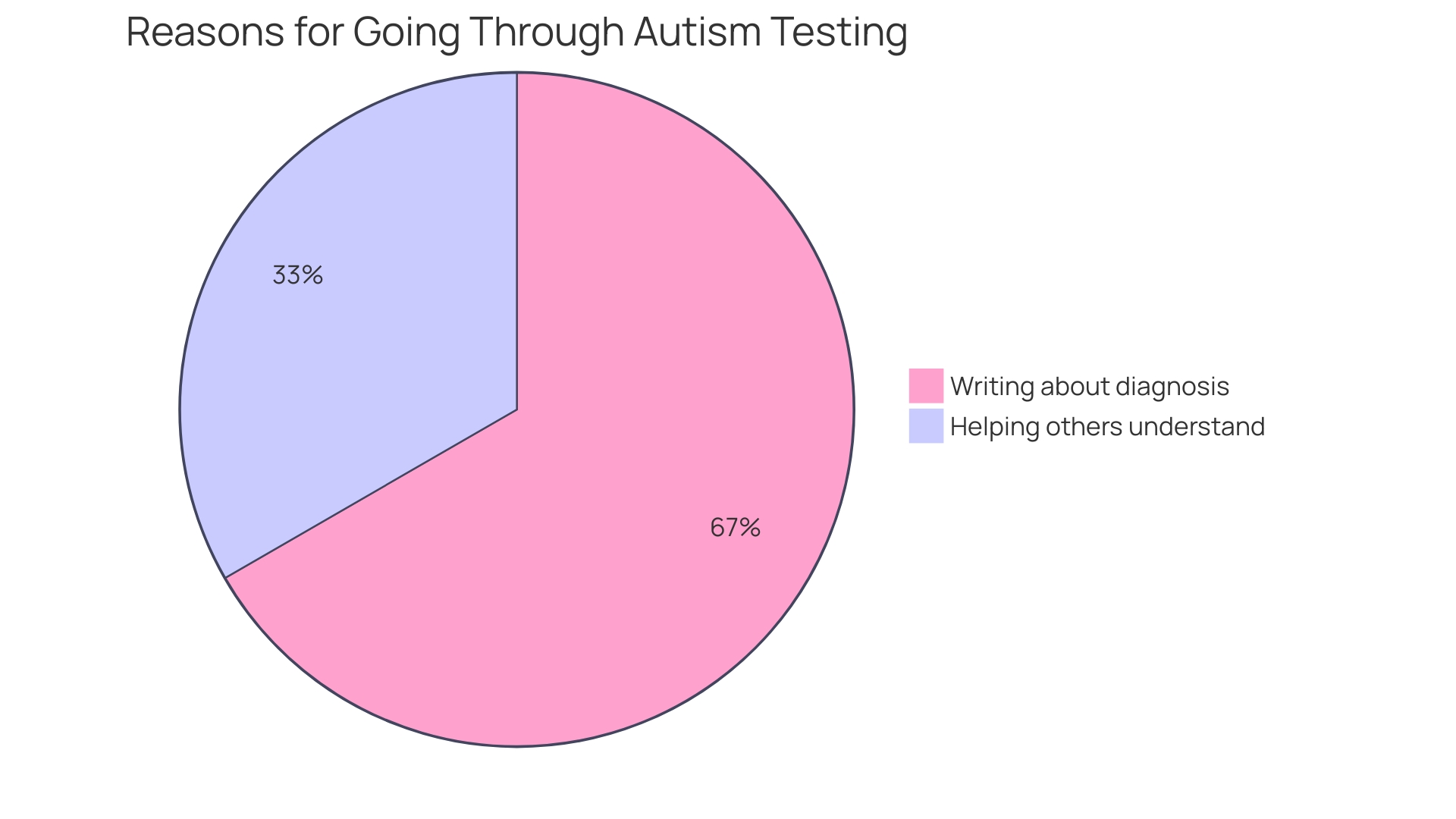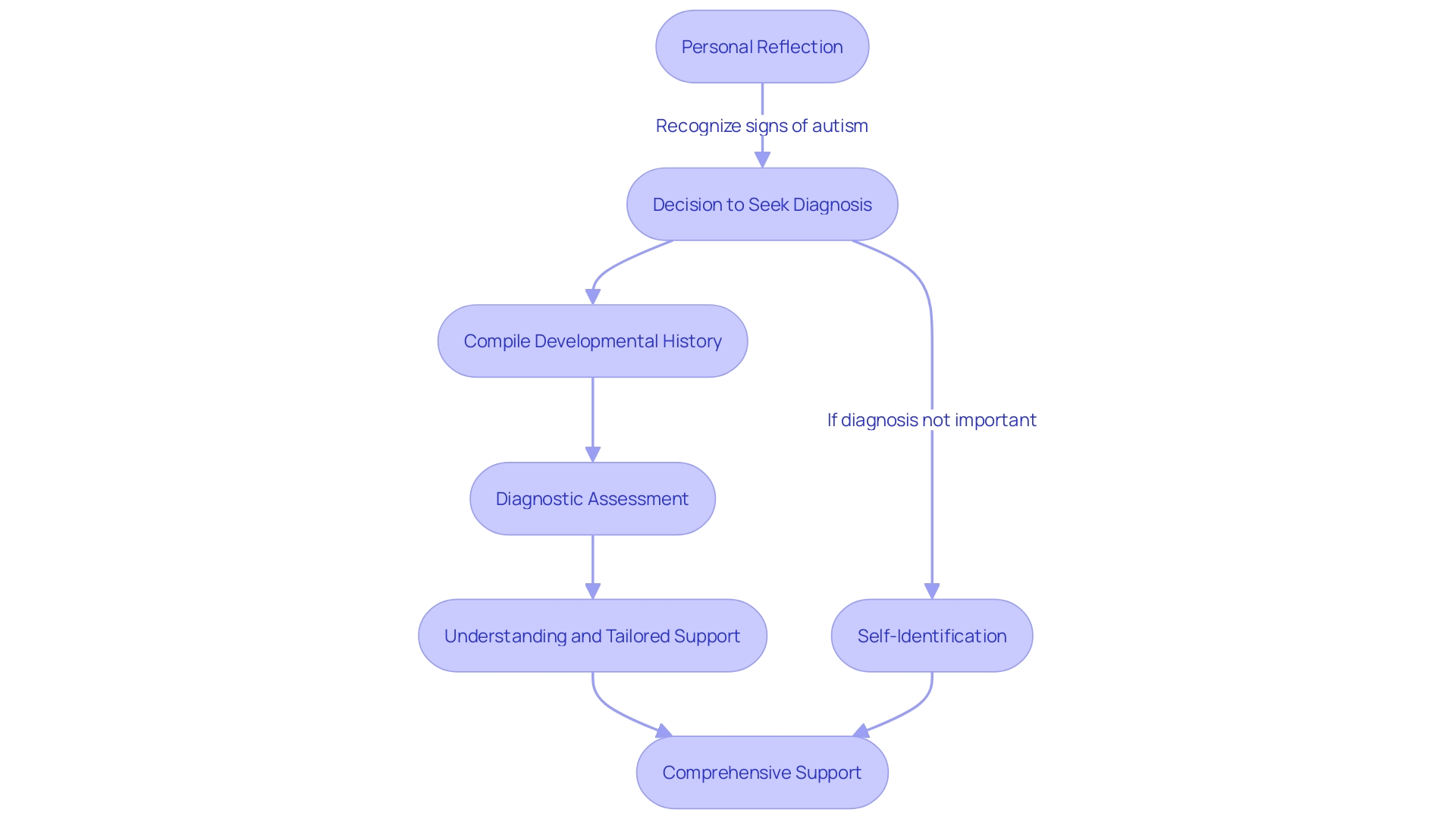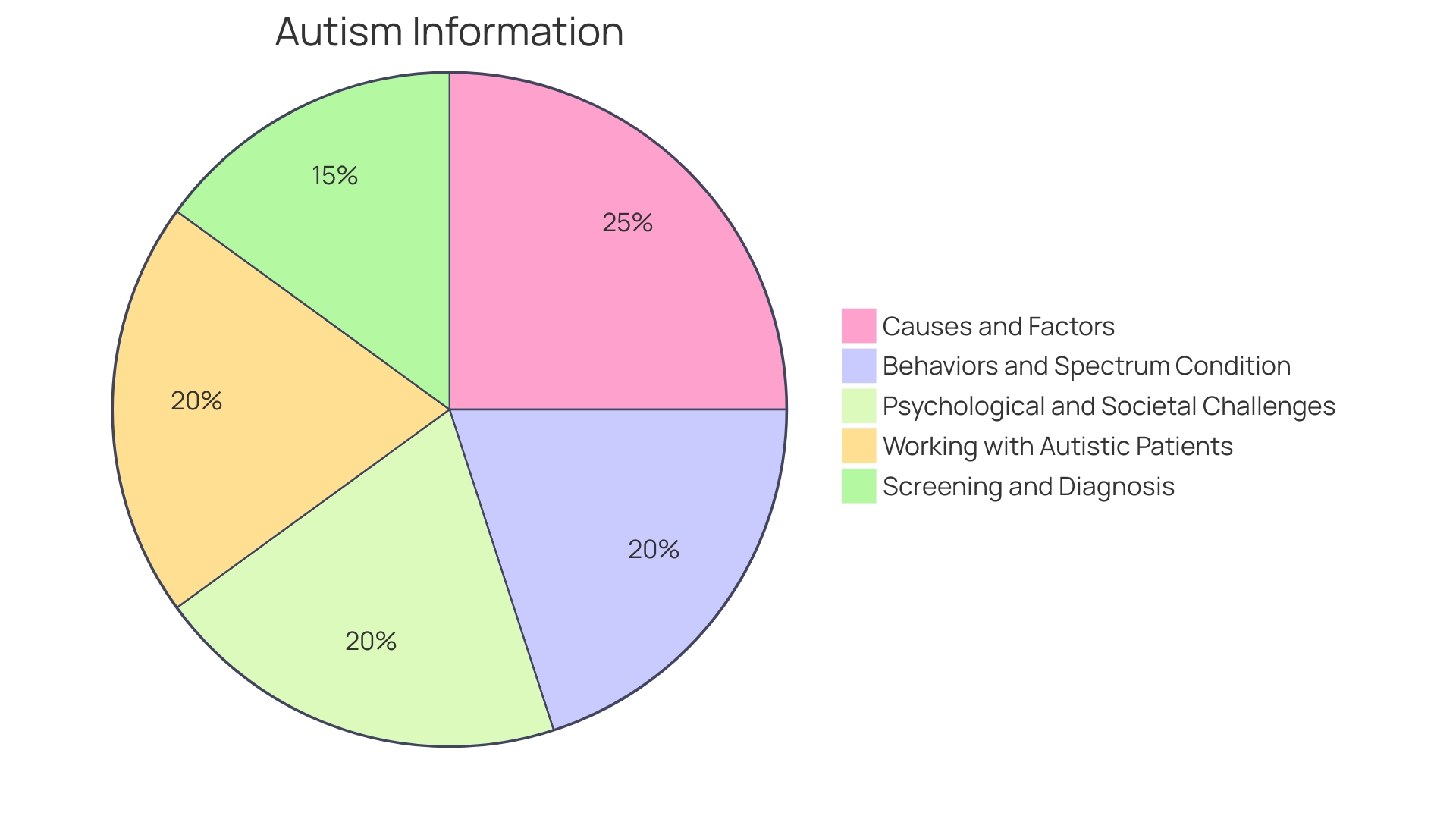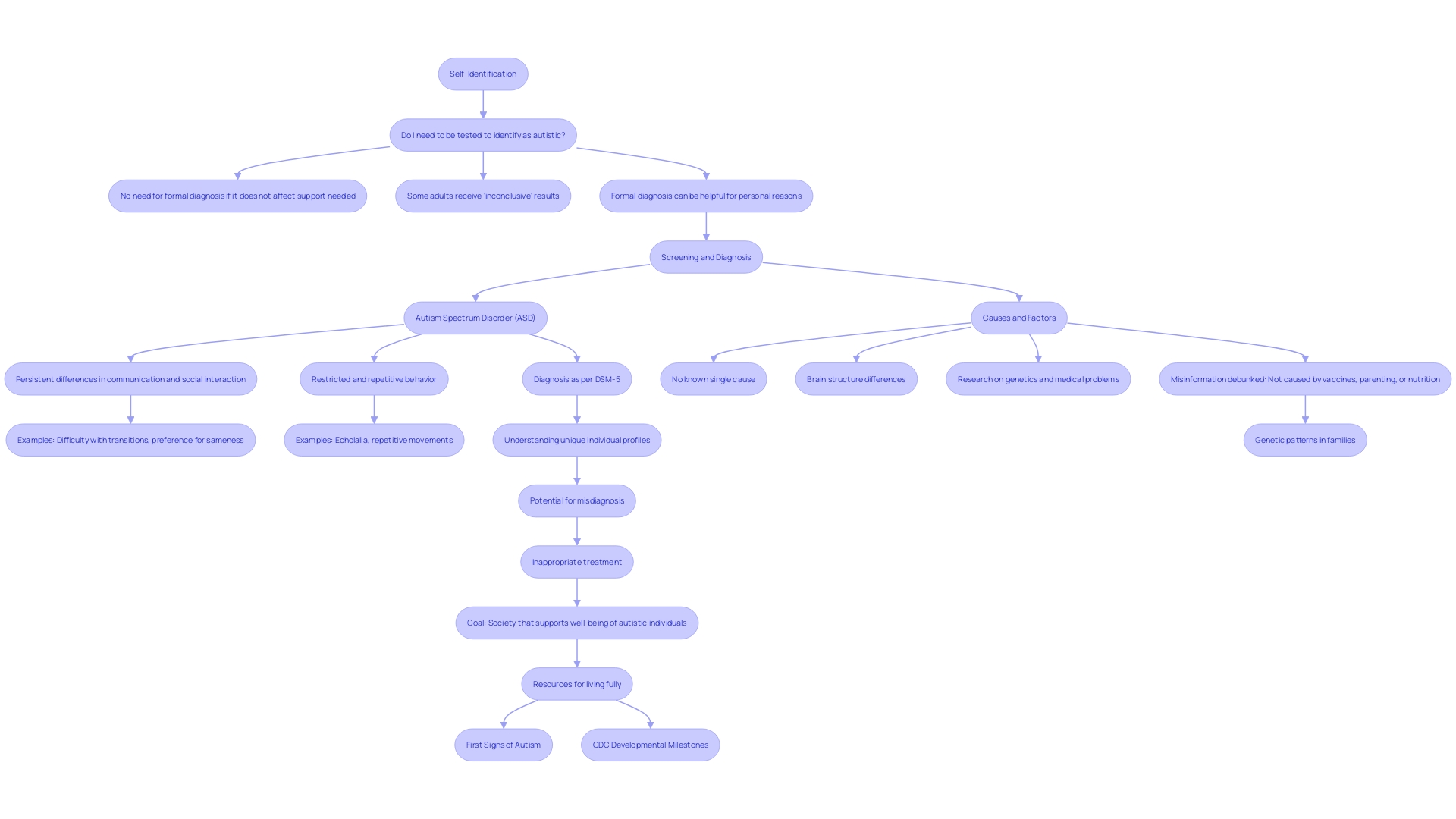Introduction
Understanding one's neurodevelopmental profile can be a pivotal moment, especially for adults who suspect they may be on the autism spectrum. For various reasons, many individuals may go through life without a formal diagnosis, relying instead on self-identification based on their understanding of autism and its traits. Despite this, there are compelling reasons why some choose to pursue a formal evaluation.
A diagnosis can offer validation, prevent questioning from others, and assist in explaining behavior to friends or family members. Moreover, knowing one's autism status can be instrumental in accessing tailored resources and support. The significance of recognizing and addressing autism in adults cannot be overstated, as research suggests that a considerable number of adults may have autism without a formal diagnosis.
Heather Florio's experience exemplifies the transformative power of self-knowledge and acceptance. Initiatives, such as the one led by Christopher McDougle, MD, at Harvard Medical School, highlight the necessity of quality medical care for autistic adults. The landscape of autism diagnosis and care is evolving, but there's still much to be discovered, particularly regarding the adult autistic population.
Why Pursue an Adult Autism Evaluation
Understanding one's neurodevelopmental profile can be a pivotal moment, especially for adults who suspect they may be on the autism spectrum. For various reasons, many individuals may go through life without a formal diagnosis, relying instead on self-identification based on their understanding of autism and its traits. It's important to note that one does not necessarily require a formal diagnosis to identify as autistic. The neurodivergent community widely accepts self-diagnosis, especially considering the challenges and limitations of the medical testing model for autism that often leaves adults with inconclusive results.
Despite this, there are compelling reasons why some choose to pursue a formal evaluation. For instance, a diagnosis can offer a form of validation, preventing the questioning of one's experiences by others. It can also assist in explaining one's behavior to friends or family members who may struggle to understand or accept a self-diagnosis. Moreover, knowing one's autism status can be instrumental in accessing tailored resources and support that might otherwise be unavailable.
The significance of recognizing and addressing autism in adults cannot be overstated. Research indicates that the number of diagnosed autistic adults is approximately 1 in 45 in the U.S. This figure suggests that a considerable number of adults may have autism without a formal diagnosis, potentially due to misdiagnosis or a lack of recognition of autism's manifestations in adults, which can include challenges with social communication and restricted, repetitive behaviors.
The impact of an adult autism diagnosis can be profound, as illustrated by Heather Florio's experience. Diagnosed at 41, Florio's newfound understanding of her neurodiversity allowed her to embrace her unique qualities and dispel feelings of being 'different' or 'wrong.' Her story emphasizes the transformative power of self-knowledge and acceptance.
Additionally, initiatives like the one led by Christopher McDougle, MD, at Harvard Medical School, seek to improve healthcare for autistic adults. This initiative highlights the necessity of quality medical care for autistic individuals throughout their lifespan, especially after they transition out of the educational system, which often provides structured support.
The landscape of autism diagnosis and care is evolving, but there's still much to be discovered, particularly regarding the adult autistic population. Experts like Gregory Wallace, PhD, emphasize the need for more research into the lives of middle-aged and older autistic adults, as current knowledge is predominantly focused on children and young adults. In light of these findings, pursuing an adult autism evaluation can unlock a deeper understanding of oneself, provide a gateway to community and support, and pave the way for a more inclusive society where neurodiversity is recognized and valued.

Preparing for an Adult Autism Evaluation
The journey to an adult autism evaluation often begins with personal reflection on one's unique experiences and behaviors. While a formal diagnosis is not a requisite for self-identification within the neurodivergent community, it can be a gateway to tailored support and understanding. It's crucial to recognize that autism is a spectrum, manifesting differently in each individual, with no single known cause. For some, like Heather Florio who was diagnosed at 41, obtaining a diagnosis can be affirming and life-changing.
Before the evaluation, it's helpful to compile a detailed account of one's developmental history, characteristics, and challenges faced in social communication and repetitive behaviors. This preparation aids the diagnostic process, which hinges on criteria outlined in the DSM-5, including persistent differences in social interaction and restricted patterns of behavior. As the CDC reports that as many as 1 in 36 individuals may be on the spectrum, understanding these signs is pivotal.
The evaluation process itself is multifaceted, involving a combination of self-reported experiences and professional assessments. It's important to approach the evaluation with clarity on what to expect and with all necessary information at hand to ensure a comprehensive assessment. The Interagency Autism Coordinating Committee (IACC) and other federal entities continue to work towards enhancing autism research and services, reflecting the growing need for improved understanding and support for those on the spectrum.

The Diagnostic Process for Adults
Understanding the journey to an adult autism diagnosis can be critical for those who have lived with undiagnosed symptoms for years. The path to a diagnosis begins with recognizing the potential signs of autism spectrum disorder (ASD), which affect individuals differently and to varying degrees. For adults, the hallmarks of autism include challenges with social communication skills and restricted, repetitive behaviors. If these signs resonate, it may be worthwhile to consider a formal assessment, especially since statistics indicate that 1 in 45 adults in the U.S. are diagnosed with ASD.
The assessment process is multi-faceted, involving a detailed evaluation by healthcare professionals. It's essential to understand that while self-diagnosis is accepted within the autistic and neurodivergent community, a professional diagnosis can open doors to tailored resources and support. The American Psychiatric Association's Diagnostic and Statistical Manual (DSM-5) provides the criteria used by clinicians, which includes persistent differences in communication and social interaction across various environments, along with restricted and repetitive behaviors.
Real-world stories, such as that of Heather Florio, who was diagnosed at 41, illustrate the transformative impact of receiving a diagnosis. It can lead to self-acceptance and access to necessary supports. Organizations like The Autism Community in Action (TACA) emphasize the value of early and accurate diagnosis, as early intervention can lead to better outcomes.
However, the decision to pursue a diagnosis is personal and may depend on whether it would make a significant difference in accessing support and succeeding in various life domains. It's important to consider one's unique circumstances and the potential benefits of a diagnosis, keeping in mind that, for some, the journey to diagnosis can be long and complex, but for others, it may provide the key to a more fulfilling life.
Professionals Involved in Adult Autism Diagnosis
Securing an adult autism diagnosis is not always necessary for self-identification, as many within the autistic community embrace self-diagnosis due to the challenges posed by the current medical testing model. Despite this, some individuals pursue a formal diagnosis for personal validation or to facilitate understanding among those close to them. The process often requires input from a range of specialists, each bringing their expertise to bear.
Psychologists and psychiatrists are at the forefront, assessing behavioral patterns and mental health conditions that may accompany autism. Speech-language pathologists also contribute, particularly when there are concerns about communication skills – a common area of difficulty for autistic individuals. Recent studies underscore the need for professionals to have a deeper understanding of autism, as a lack of knowledge can lead to misdiagnosis and inappropriate treatment, exacerbating the challenges faced by autistic adults.
Personal stories, like that of Heather Florio, who was diagnosed at 41, illustrate the transformative impact a diagnosis can have, offering a newfound self-acceptance after years of feeling different. However, it's important to note that the therapeutic needs of autistic adults for common conditions like anxiety and depression may not differ significantly from those of the general population. This highlights the potential for healthcare providers to extend their services to autistic adults with minimal additional training, emphasizing the importance of adapting practices to better serve this community.
What to Expect During the Evaluation
Navigating the process of an adult autism evaluation can seem daunting, but understanding the steps involved brings clarity and confidence. The evaluation typically starts by examining a variety of behaviors that are characteristic of autism spectrum disorder (ASD). As per the American Psychiatric Association's Diagnostic and Statistical Manual (DSM-5), these behaviors include persistent differences in communication, social interaction across multiple contexts, and restricted, repetitive patterns of behavior, activities, or interests. Examples of these can be a pronounced adherence to routines, repetitive motor movements, and highly specific interests. It is essential to note that autism is a 'spectrum condition,' meaning it manifests in different ways and intensities in each individual.
Recent statistics suggest that as many as 1 in 36 individuals may be on the autism spectrum. This underscores the importance of understanding and recognizing the signs of autism in adults, which may have gone unnoticed or misdiagnosed earlier in life.
While self-diagnosis is accepted within the autistic and neurodivergent community, some individuals opt for a formal diagnosis to access certain resources or for personal validation. It's crucial to remember that the need for an official diagnosis is a personal choice and not a necessity for everyone.
Awareness and advocacy are growing, as evidenced by recent initiatives that explore how to better integrate autistic individuals into the workforce. With only about 3 in 10 working-age autistic individuals employed, efforts are underway to address this gap and leverage the unique skills and perspectives that neurodiverse individuals bring to the table.
As you consider an evaluation, be aware that information from various sources, including social media, can be misleading. Approximately 32% of autism-related content on popular platforms like TikTok has been found to be inaccurate. Therefore, seeking information from reliable sources and healthcare professionals during the evaluation process is paramount.

Tools and Methods Used in Diagnosis
Navigating the journey to an adult autism diagnosis involves various methods and tools that professionals use to understand and support individuals on the spectrum. Standardized assessments offer a structured approach to identify traits associated with autism, while interviews provide a personal narrative that can highlight individual experiences and challenges. Observations in different environments give clinicians insight into how autistic traits may present in real-world settings. These diagnostic tools are not just about labeling; they enable a deeper comprehension of an individual's unique profile, which can pave the way for tailored support and interventions. This understanding is crucial, considering that a lack of awareness among healthcare professionals can lead to misdiagnosis and inappropriate treatment, further compounding the stress on autistic adults. It's important to acknowledge that self-identification is also a valid and respected option within the autistic community, particularly when medical testing can yield inconclusive results. Whether through formal diagnosis or self-identification, the goal is to foster a society that equips individuals with the understanding and resources they need for a fair and equitable chance at well-being and fulfillment.

Impact of Diagnosis on Daily Life and Relationships
Receiving an adult autism diagnosis can be a transformative experience, influencing self-perception, relationships, career paths, and the pursuit of support. Statistics reveal that 1 in 45 adults in the U.S. has been diagnosed with autism spectrum disorder (ASD), a figure reflective of both heightened awareness and potential undiagnosed cases. For many, the diagnosis comes after a lifetime of navigating social challenges and distinct behavioral patterns without fully understanding the underlying reasons.
Adults on the spectrum often grapple with social communication and may exhibit restricted and repetitive behaviors. These characteristics can manifest in various ways, impacting career progression and job satisfaction. Studies indicate that autistic adults frequently aspire to advance professionally but encounter obstacles such as limited opportunities post-disclosure of their diagnosis and historical employment gaps. This underemployment can be mitigated through supportive measures like mentorship programs.
The importance of tailored approaches when working with autistic patients is paramount. Therapeutic needs may not differ significantly from the general population for conditions like anxiety and depression. However, many report difficulties in accessing services, as practitioners may lack the specialized knowledge to address their needs effectively. With a small investment in training and an open-minded approach, health professionals can significantly improve care for autistic adults.
Moreover, recent initiatives aim to enhance workplace inclusion for autistic individuals. Feedback from employers, autism charities, and specialist support groups has been integral to developing strategies that not only raise awareness and reduce stigma but also harness the unique talents of autistic employees, with objectives to improve employment rates within the next five years.
Accessing Support and Resources Post-Diagnosis
Understanding your needs after an adult autism diagnosis is a pivotal step towards harnessing appropriate support and resources. While a formal diagnosis is not always necessary, as many in the autistic and neurodivergent community embrace self-identification, it can be instrumental for some individuals. It provides a formal acknowledgment of one's condition, which can be crucial for accessing certain services or for personal validation, as expressed by individuals who have navigated this path.
Statistically, 1 in 45 adults in the U.S. are diagnosed with autism spectrum disorder (ASD), indicating a significant number of adults may be living without a formal diagnosis. Recognizing the signs of autism, such as challenges with social communication and restricted, repetitive behaviors, can lead to greater self-understanding and guide the search for suitable interventions.
Access to quality care is essential. Initiatives such as the Adult Autism Health Resources project highlight the necessity for informed medical care for autistic adults. This acknowledgment comes with the understanding that the therapeutic needs of autistic individuals, particularly for common conditions like anxiety or depression, may not differ significantly from those without autism. However, the approach to care must account for the nuances of autism. This includes the development of trust and understanding the unique needs of autistic patients.
The National Autistic Society's Autism Accreditation program evidences the strides being made in enhancing support structures. With over 500 accredited organizations worldwide, the program underscores the importance of meeting rigorous standards and embracing continuous improvement to better serve the autistic community.
Whether opting for self-diagnosis or seeking a formal assessment, the journey towards finding support and resources is deeply personal. It requires an environment that respects individual choices and provides access to care that recognizes the strengths and specific needs of autistic adults.
Navigating Disclosure and Social Reactions
Navigating the intricacies of disclosing an autism diagnosis as an adult requires sensitivity and understanding, not just from yourself but also from those around you. For many adults, the realization of being on the autism spectrum (ASD) comes later in life, with current statistics showing that 1 in 45 adults in the U.S. are diagnosed with ASD. This revelation, while providing personal clarity, can also lead to a myriad of social challenges. It's vital to approach disclosure decisions with care, considering both personal comfort and the potential impact on relationships.
Autism in adults presents with the same core characteristics as in children: difficulties in social communication and repetitive behaviors. Recognizing these signs is the first step in self-awareness and understanding. Yet, the decision to share a diagnosis is deeply personal and can vary greatly. Some, like Heather Florio, find a diagnosis later in life to be transformative, allowing them to finally accept themselves and encouraging others to seek understanding.
However, the response to this disclosure can be mixed. For individuals like Florio, the decision to be tested and disclose was motivated by a need for self-validation and to help others understand her perspective. Others may choose not to seek a formal diagnosis, considering the challenges in the medical testing model and the openness of the autistic and neurodivergent community to self-identification.
When it comes to educating others about autism, it's important to dispel common misconceptions, such as the idea of autistic masking being a form of 'pretense.' Instead, it is a strategy used by many to adapt to societal norms, a testament to the resilience and adaptability of autistic individuals. Despite a lack of extensive research on adult autism, as highlighted by Dr. Gregory Wallace, understanding and acceptance of autism in adults are growing.
The social reactions to disclosing an autism diagnosis can vary, but with the right approach, it can be a positive and empowering experience. It is a process that involves educating others, setting personal boundaries, and seeking support from within and outside the autistic community. By embracing your diagnosis and the unique perspective it offers, you can foster greater understanding and acceptance in your social circles.
Conclusion
Understanding one's neurodevelopmental profile is essential for adults suspecting they may be on the autism spectrum. Pursuing a formal evaluation provides validation, tailored support, and resources. Research suggests a significant number of adults may have undiagnosed autism.
Initiatives led by professionals emphasize the necessity of quality medical care for autistic adults. However, more research is needed to understand the lives of autistic adults.
Navigating the evaluation process involves personal reflection and compiling a detailed developmental history. Assessments by psychologists, psychiatrists, and speech-language pathologists contribute to the diagnosis. Tailored approaches and improved access to care are crucial for addressing the needs of autistic adults.
After a diagnosis, understanding one's needs is vital for accessing appropriate support and resources. While not always necessary, a formal diagnosis can provide acknowledgment and facilitate access to services. The journey towards support and resources is personal, requiring respect for individual choices and care that recognizes the strengths and specific needs of autistic adults.
Disclosing an autism diagnosis as an adult requires sensitivity and understanding. The decision to share a diagnosis varies, and educating others about autism is important for fostering understanding and acceptance. Embracing a diagnosis contributes to a more inclusive society by cultivating greater understanding and acceptance.
In conclusion, pursuing an adult autism evaluation leads to self-knowledge, validation, and access to tailored support. Recognizing and addressing autism in adults is crucial, and initiatives emphasize the necessity of quality medical care. More research is needed to understand the lives of autistic adults.
Navigating the evaluation process, securing a diagnosis, and accessing appropriate support empower individuals and contribute to a more inclusive society that values neurodiversity.




